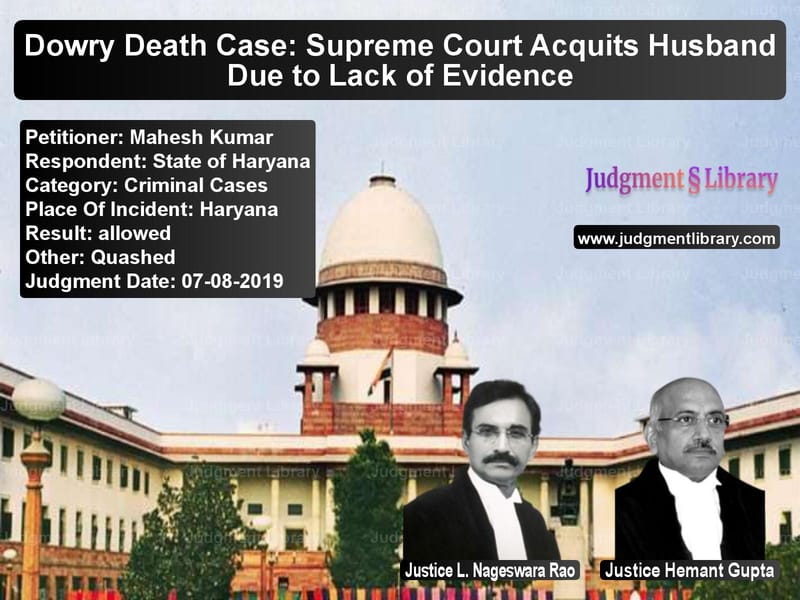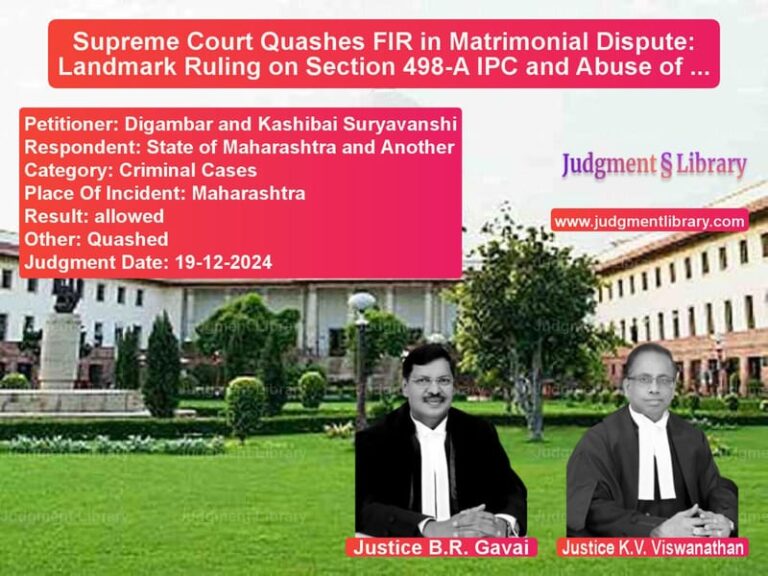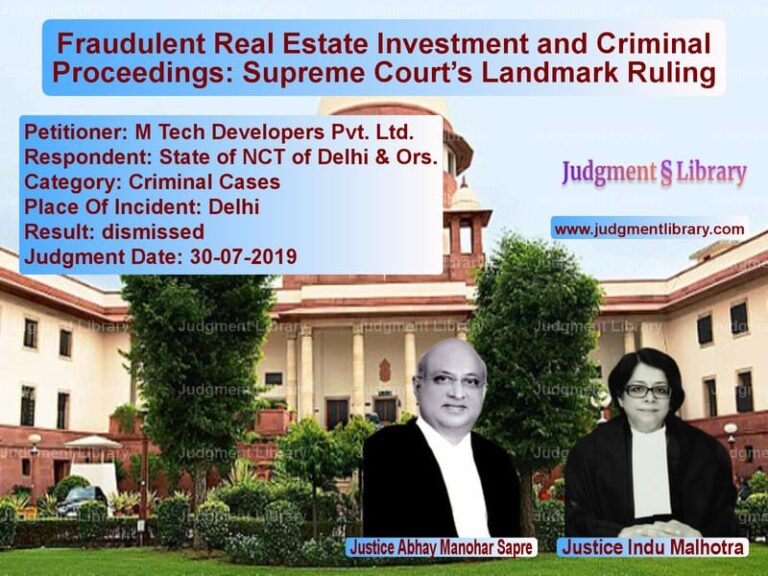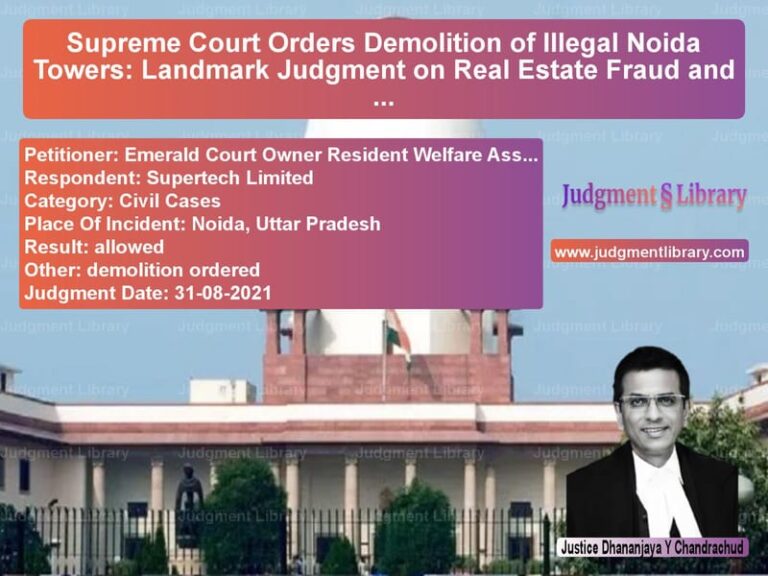Dowry Death Case: Supreme Court Acquits Husband Due to Lack of Evidence
The case of Mahesh Kumar v. State of Haryana revolves around allegations of dowry harassment and the tragic death of the appellant’s wife, Omwati. The Supreme Court was called upon to determine whether the prosecution had successfully proven the elements of Section 304-B of the Indian Penal Code (IPC), which deals with dowry death. The court ultimately found that the evidence presented did not establish a proximate link between the alleged harassment and the victim’s death, leading to the acquittal of the accused.
Background of the Case
The case was initiated based on a complaint by Sohan Lal (PW3), the father of the deceased. He alleged that his daughter was subjected to cruelty by her husband, Mahesh Kumar, along with her in-laws, due to demands for dowry. The prosecution contended that after enduring years of mistreatment, Omwati died under suspicious circumstances on February 8, 1994, at the Civil Hospital in Gurgaon.
According to the complainant, Mahesh Kumar and his family frequently demanded dowry, including a gold chain and cash. On several occasions, Omwati allegedly expressed fears for her life. Her father recounted an instance where he paid Rs. 2,000 to the accused, who had demanded Rs. 5,000.
Following Omwati’s death, an FIR was registered against Mahesh Kumar, his mother Savitri Devi, father Rajpal, and sister Kamlesh. After trial, Mahesh Kumar and Savitri Devi were convicted under Section 304-B IPC, while the other two accused were acquitted.
Trial Court’s Findings
The trial court relied on the testimonies of the deceased’s father (PW3) and brother (PW4), as well as letters allegedly written by the deceased. The court ruled that the prosecution had proven the charges against Mahesh Kumar and his mother. Consequently, Mahesh Kumar was sentenced to ten years of imprisonment.
High Court’s Decision
On appeal, the Punjab and Haryana High Court upheld Mahesh Kumar’s conviction but reduced his sentence to seven years, considering the prolonged nature of the case. However, the High Court acquitted Savitri Devi due to insufficient evidence.
Appeal to the Supreme Court
Mahesh Kumar approached the Supreme Court, challenging his conviction. His counsel argued that:
- The letters written by the deceased did not indicate any demand for dowry close to the time of her death.
- The prosecution failed to prove that there was cruelty or harassment “soon before her death,” as required under Section 304-B IPC.
- There was no independent evidence linking the accused to the crime.
The State, on the other hand, contended that:
- The deceased had died under unnatural circumstances within seven years of marriage.
- The evidence suggested continuous cruelty and harassment over dowry.
- The trial court had rightly convicted the appellant based on the available evidence.
Supreme Court’s Analysis
The Supreme Court examined the essential ingredients of Section 304-B IPC:
“Where the death of a woman is caused by any burns or bodily injury or occurs otherwise than under normal circumstances within seven years of her marriage and it is shown that soon before her death she was subjected to cruelty or harassment by her husband or any relative of her husband for, or in connection with, any demand for dowry, such death shall be called ‘dowry death’.”
The court stressed that for an offence under Section 304-B IPC, there must be a direct connection between the cruelty or harassment and the death of the woman. The court cited its ruling in Satvir Singh v. State of Punjab:
“It is not enough that harassment or cruelty was caused to the woman with a demand for dowry at some time. It should have happened ‘soon before her death’ to invoke Section 304-B IPC.”
The bench also referred to Hira Lal v. State (Govt. of NCT, Delhi), emphasizing that:
“The prosecution is obliged to show that soon before the occurrence, there was cruelty or harassment. Evidence in that regard has to be led by the prosecution.”
In the present case, the Supreme Court found that:
- The prosecution had not proven any dowry demand “soon before” the deceased’s death.
- The letters relied upon did not specifically mention recent dowry demands.
- Independent witnesses who could have corroborated the claims were not examined.
- The prosecution failed to prove the ingredients required under Section 304-B IPC.
Final Judgment
The Supreme Court ruled:
“In view of the judgments referred to above, the prosecution has failed to prove either the demand of dowry or that any such demand was raised soon before her death. Therefore, the essential ingredients of offence under Section 304-B IPC are not proved by the prosecution.”
Mahesh Kumar was acquitted, and his conviction was set aside. The court directed that he be released immediately unless involved in any other case.
Implications of the Judgment
This ruling reinforces the principle that a conviction under Section 304-B IPC cannot be based solely on allegations of past cruelty. The prosecution must establish a direct link between harassment and the woman’s death. The court’s decision sets a significant precedent for dowry death cases, ensuring that convictions are based on substantial evidence rather than presumption.
Conclusion
The Supreme Court’s judgment in this case serves as a crucial reminder that justice must be administered based on evidence. While dowry-related harassment remains a serious issue, courts must ensure that each case meets the legal requirements for conviction. This ruling highlights the need for strong evidence and corroborative testimony to sustain charges under Section 304-B IPC.
Petitioner Name: Mahesh Kumar.Respondent Name: State of Haryana.Judgment By: Justice L. Nageswara Rao, Justice Hemant Gupta.Place Of Incident: Haryana.Judgment Date: 07-08-2019.
Don’t miss out on the full details! Download the complete judgment in PDF format below and gain valuable insights instantly!
Download Judgment: Mahesh Kumar vs State of Haryana Supreme Court of India Judgment Dated 07-08-2019.pdf
Direct Downlaod Judgment: Direct downlaod this Judgment
See all petitions in Dowry Cases
See all petitions in Murder Cases
See all petitions in Judgment by L. Nageswara Rao
See all petitions in Judgment by Hemant Gupta
See all petitions in allowed
See all petitions in Quashed
See all petitions in supreme court of India judgments August 2019
See all petitions in 2019 judgments
See all posts in Criminal Cases Category
See all allowed petitions in Criminal Cases Category
See all Dismissed petitions in Criminal Cases Category
See all partially allowed petitions in Criminal Cases Category







